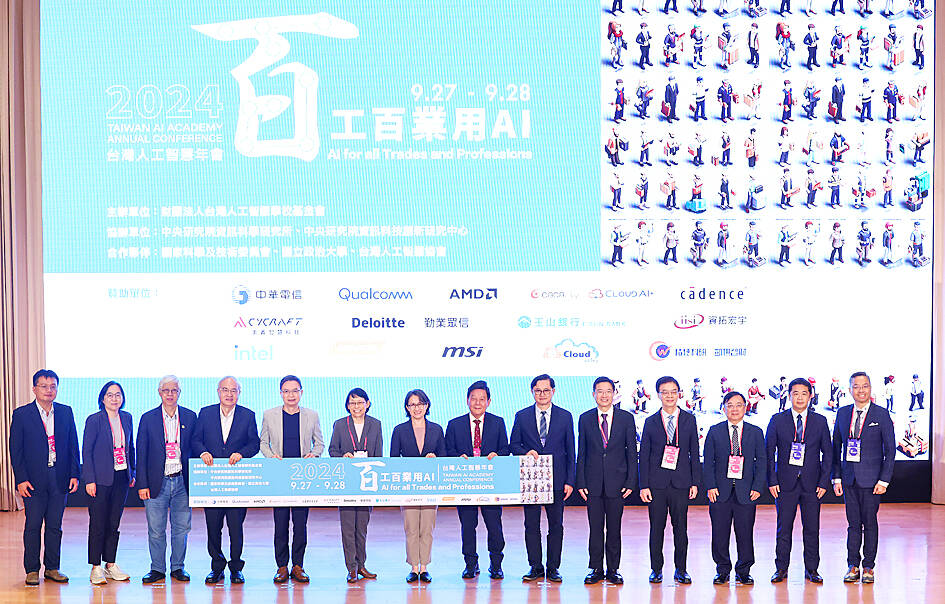In the artificial intelligence (AI) era, enterprises and nations already at the top might get stronger, but “Taiwan still has plenty of advantages with its excellence in hardware manufacturing,” the head of a technology company told a forum in Taipei yesterday.
AI will be immersed in people’s daily life as the Internet has become in the past 30 years, Pegatron Corp (和碩) chairman Tung Tzu-hsien (童子賢) said at the Taiwan AI Academy Annual Conference.
“But different from the Internet age, which saw disruptions [in terms of market share] in the tech industry, AI would likely only make those who are already strong stronger, be they enterprises or countries,” he said.

Photo: CNA
That is because AI development requires massive amounts of electricity and computing power, he said.
“Educational institutions, enterprises or nations without the needed funding would simply lose their initiative,” he added.
For example, developing a large language model such as Open AI’s GPT-4 requires US$78 million for its training, and US$190 million for Google’s Gemini Ultra, Tung said.
The massive use of computational power and electricity has seen Open AI’s Sam Altman invest in nuclear companies and Microsoft Corp strike a deal to restart a reactor at the Three Mile Island plant in Pennsylvania, said Tung, who has advocated retaining nuclear power in Taiwan.
The cost of the needed computational power for AI infrastructure, which has to be bolstered by a sufficient supply of energy and highly advanced chips, is extraordinarily high.
“So even Apple has decided to withdraw from developing AI infrastructure, and redirected its strategy to partner with OpenAI and integrate ChatGPT into the operating systems for its devices,” Tung said. “This also tells us that as long as you have a strong grip on the market and the platform, you might not necessarily be the underdog in the AI-dominant world.”
For Tung, Taiwan’s semiconductor and hardware manufacturing sectors are likewise in an advantageous position.
As AI would be used widely in all kinds of applications and industries, Taiwan is expected to not only gain in cloud equipment, but also edge devices such as personal computers and smartphones, which would all be transformed to support AI operations, he said.
“The overall output value of Taiwan’s semiconductor industry is expected to hit NT$5.3 trillion [US$167.26 billion] this year, which is even higher than the NT$4.8 trillion estimated at the end of 2023,” which was said to be a new high, he said, attributing the growth to the AI boom.
He said that when Open AI was founded in 2015, the average age of the three founders was 29, “but what they have created would not have been possible without the chips made by Taiwan Semiconductor Manufacturing Co (台積電) founded by the now 92-year-old Morris Chang (張忠謀).”
The same applies to electric vehicles (EVs), Tung said.
“Taiwan actually lags behind in the use of EVs, with an adoption rate of less than 10 percent, but as Taiwan is strong in manufacturing electronic parts and components, it can still be a good partner for the world’s main vehicle brands,” he said.

The CIA has a message for Chinese government officials worried about their place in Chinese President Xi Jinping’s (習近平) government: Come work with us. The agency released two Mandarin-language videos on social media on Thursday inviting disgruntled officials to contact the CIA. The recruitment videos posted on YouTube and X racked up more than 5 million views combined in their first day. The outreach comes as CIA Director John Ratcliffe has vowed to boost the agency’s use of intelligence from human sources and its focus on China, which has recently targeted US officials with its own espionage operations. The videos are “aimed at

STEADFAST FRIEND: The bills encourage increased Taiwan-US engagement and address China’s distortion of UN Resolution 2758 to isolate Taiwan internationally The Presidential Office yesterday thanked the US House of Representatives for unanimously passing two Taiwan-related bills highlighting its solid support for Taiwan’s democracy and global participation, and for deepening bilateral relations. One of the bills, the Taiwan Assurance Implementation Act, requires the US Department of State to periodically review its guidelines for engagement with Taiwan, and report to the US Congress on the guidelines and plans to lift self-imposed limitations on US-Taiwan engagement. The other bill is the Taiwan International Solidarity Act, which clarifies that UN Resolution 2758 does not address the issue of the representation of Taiwan or its people in

US Indo-Pacific Commander Admiral Samuel Paparo on Friday expressed concern over the rate at which China is diversifying its military exercises, the Financial Times (FT) reported on Saturday. “The rates of change on the depth and breadth of their exercises is the one non-linear effect that I’ve seen in the last year that wakes me up at night or keeps me up at night,” Paparo was quoted by FT as saying while attending the annual Sedona Forum at the McCain Institute in Arizona. Paparo also expressed concern over the speed with which China was expanding its military. While the US

SHIFT: Taiwan’s better-than-expected first-quarter GDP and signs of weakness in the US have driven global capital back to emerging markets, the central bank head said The central bank yesterday blamed market speculation for the steep rise in the local currency, and urged exporters and financial institutions to stay calm and stop panic sell-offs to avoid hurting their own profitability. The nation’s top monetary policymaker said that it would step in, if necessary, to maintain order and stability in the foreign exchange market. The remarks came as the NT dollar yesterday closed up NT$0.919 to NT$30.145 against the US dollar in Taipei trading, after rising as high as NT$29.59 in intraday trading. The local currency has surged 5.85 percent against the greenback over the past two sessions, central